
John Wood Campbell Jr. was an American science fiction writer and editor. He was editor of Astounding Science Fiction from late 1937 until his death and was part of the Golden Age of Science Fiction. Campbell wrote super-science space opera under his own name and stories under his primary pseudonym, Don A. Stuart. Campbell also used the pen names Karl Van Kampen and Arthur McCann. His novella Who Goes There? was adapted as the films The Thing from Another World (1951), The Thing (1982), and The Thing (2011).
The first Golden Age of Science Fiction, often recognized in the United States as the period from 1938 to 1946, was an era during which the science fiction genre gained wide public attention and many classic science fiction stories were published. In the history of science fiction, the Golden Age follows the "pulp era" of the 1920s and 1930s, and precedes New Wave science fiction of the 1960s and 1970s. The 1950s are a transitional period in this scheme; however, Robert Silverberg, who came of age in the 1950s, saw that decade as the true Golden Age.
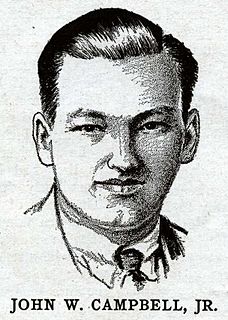
This is a bibliography of works by American writer John W. Campbell Jr.
The 20th World Science Fiction Convention, also known unofficially as Chicon III, was held August 31–September 3, 1962, at the Pick-Congress Hotel in Chicago, Illinois, United States.

Astounding: John W. Campbell Memorial Anthology is a 1973 anthology honoring American science fiction and fantasy editor John W. Campbell, in the form of an anthology of short stories by various science fiction authors, edited by Harry Harrison. It was first published in hardcover by Random House as a selection of the Science Fiction Book Club, and first published in paperback by Ballantine Books.

Analog Science Fiction and Fact is an American science fiction magazine published under various titles since 1930. Originally titled Astounding Stories of Super-Science, the first issue was dated January 1930, published by William Clayton, and edited by Harry Bates. Clayton went bankrupt in 1933 and the magazine was sold to Street & Smith. The new editor was F. Orlin Tremaine, who soon made Astounding the leading magazine in the nascent pulp science fiction field, publishing well-regarded stories such as Jack Williamson's Legion of Space and John W. Campbell's "Twilight". At the end of 1937, Campbell took over editorial duties under Tremaine's supervision, and the following year Tremaine was let go, giving Campbell more independence. Over the next few years Campbell published many stories that became classics in the field, including Isaac Asimov's Foundation series, A. E. van Vogt's Slan, and several novels and stories by Robert A. Heinlein. The period beginning with Campbell's editorship is often referred to as the Golden Age of Science Fiction.

Giants Unleashed is an anthology of science fiction short stories edited by Groff Conklin. It was first published in hardcover by Grosset & Dunlap in 1965. A paperback edition followed from the publisher's Tempo Books imprint in April 1966. It was reprinted, minus the introduction and under the alternate title Minds Unleashed, in October 1970.

Fifty Short Science Fiction Tales is an anthology of science fiction short stories and poems edited by Isaac Asimov and Groff Conklin. It was first published in paperback by Collier Books in 1963 and reprinted in 1966, 1968, 1969, 1971, 1973, 1974, 1976, and 1978; a later reprint was issued by Scribner Paperback Fiction in August 1997. The book has been translated into Italian.

Comets is an anthology of science fiction short stories edited by Isaac Asimov, Martin H. Greenberg and Charles G. Waugh as the fourth volume in their Isaac Asimov's Wonderful Worlds of Science Fiction series. It was first published in paperback by Signet/New American Library in February 1986.

The Mammoth Book of Classic Science Fiction: Short Novels of the 1930s is a themed anthology of science fiction short works edited by Isaac Asimov, Martin H. Greenberg, and Charles G. Waugh, the first in a series of six samplers of the field from the 1930s through the 1980s. It was first published in trade paperback by Robinson in June 1988. The first American edition was issued in trade paperback by Carroll & Graf in July of the same year. A hardcover edition was issued under the variant title Great Tales of Classic Science Fiction by Galahad Books in May 1990.

The Mammoth Book of Vintage Science Fiction: Short Novels of the 1950s is a themed anthology of science fiction short works edited by Isaac Asimov, Martin H. Greenberg, and Charles G. Waugh, the third in a series of six samplers of the field from the 1930s through the 1980s. It was first published in trade paperback by Robinson in 1990. The first American edition was issued in trade paperback by Carroll & Graf in the same year.
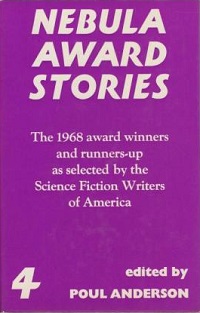
Nebula Award Stories 4 is an anthology of award-winning science fiction short works edited by Poul Anderson. It was first published in the United Kingdom in hardcover by Gollancz in November 1969. The first American edition was published by Doubleday in December of the same year. Paperback editions followed from Pocket Books in the U.S. in January 1971, and Panther in the U.K. in December 1971. The American editions bore the variant title Nebula Award Stories Four.

The Analog Anthology #2: Readers' Choice is an anthology of science fiction stories and articles drawn from Analog magazine, edited by then-current Analog editor Stanley Schmidt. It was first published in paperback by Davis Publications in January 1982, and reprinted later the same year under the alternate title Analog: Readers' Choice. A hardcover edition was issued by The Dial Press under the alternate title in March 1982.
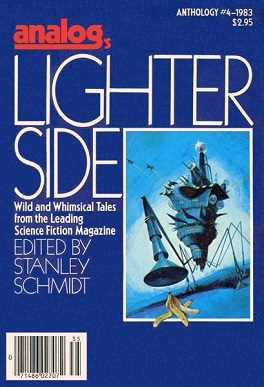
Analog's Lighter Side is the fourth in a series of anthologies of science fiction stories drawn from Analog magazine and edited by then-current Analog editor Stanley Schmidt. It was first published in paperback by Davis Publications in 1982, with a hardcover edition following from The Dial Press in January 1983.

Analog: Writers' Choice is the fifth in a series of anthologies of science fiction stories drawn from Analog magazine and edited by then-current Analog editor Stanley Schmidt. It was first published in paperback by Davis Publications and hardcover by The Dial Press in 1983.
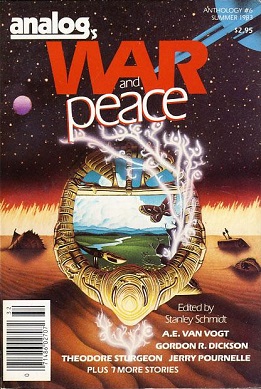
Analog's War and Peace is the sixth in a series of anthologies of science fiction stories drawn from Analog magazine and edited by then-current Analog editor Stanley Schmidt. It was first published in paperback by Davis Publications and hardcover by The Dial Press in June 1983. The hardcover edition bore the alternate title War and Peace: Possible Futures from Analog.
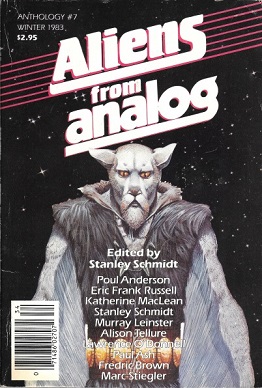
Aliens from Analog is the seventh in a series of anthologies of science fiction stories drawn from Analog magazine and edited by then-current Analog editor Stanley Schmidt. It was first published in paperback by Davis Publications and hardcover by The Dial Press in 1983.

Analog: Writers' Choice, Volume II is the eighth in a series of anthologies of science fiction stories drawn from Analog magazine and edited by then-current Analog editor Stanley Schmidt. It was first published in paperback by Davis Publications and hardcover by The Dial Press in 1984.
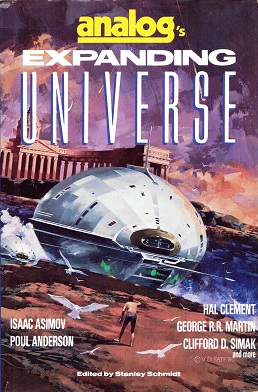
Analog's Expanding Universe is the tenth in a series of anthologies of science fiction stories drawn from Analog magazine and edited by then-current Analog editor Stanley Schmidt. It was first published in hardcover by Davis Publications for Longmeadow Press in 1986.

Robert Silverberg Presents the Great SF Stories: 1964 is an American anthology of short stories, edited by Robert Silverberg and Martin H. Greenberg, first published in hardcover by NESFA Press in December 2001. It is a continuation of the Isaac Asimov Presents The Great SF Stories series of short story anthologies, which attempts to list the great science fiction stories from the Golden Age of Science Fiction.


















